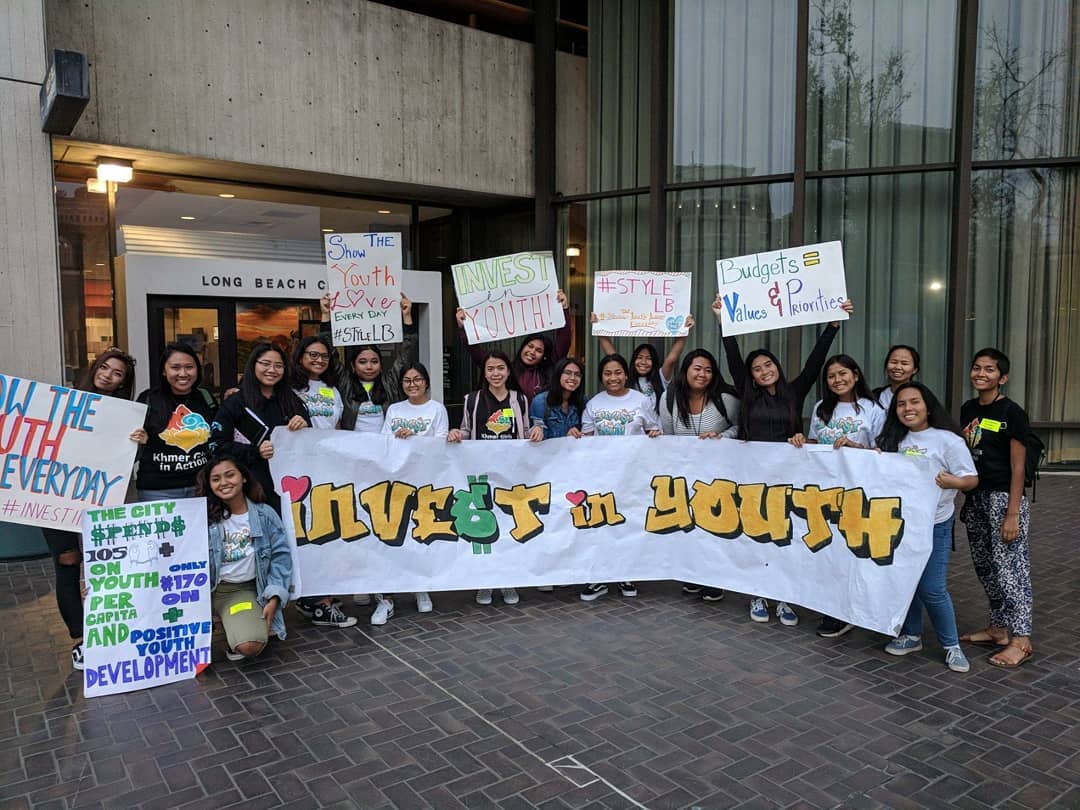A People’s Budget from the People’s Wallet: Community Advocates Victorious in Bringing More Equity to City Budget
6 minute readThe coalition behind the “People’s Budget Proposal” scored some important wins with the inclusion of funding in the city’s 2019 budget meant to increase equity among residents.
A grassroots lobbying effort by the Housing Habitability Coalition, the Invest in Youth Campaign, the Long Beach Language Access Coalition, and the Sanctuary Long Beach Campaign helped influence Mayor Robert Garcia’s budget recommendations, which were baked into the next city budget. Numerous recommendations Garcia made aligned with the priorities listed in the People’s Budget Proposal, including funding legal representation for immigrants, improving housing habitability, increasing youth development programs, and better language access.
But before the budget was a done deal, advocates of the People’s Budget Proposal were put on an emotional roller coaster by the Budget Oversight Committee, which is chaired by Councilmember Stacy Mungo (CD-5).
A few hours before the council was set to vote on the city budget, the BOC recommended cutting away certain elements of the mayor’s budget recommendations and severly undercutting others. However, the council ultimately decided to fully fund the mayoral add-ons, which will be paid for by the current budget surplus and savings from the city’s healthcare contract.
The $3-billion city budget was approved by the council during the wee hours of Wednesday morning, near the end of a marathon meeting and goes into effect Oct. 1.
A newly established Long Beach Justice Fund of $250,000 will provide legal defense for residents facing deportation. Because immigration law falls under the civil code, undocumented immigrants facing possible deportation are not constitutionally guaranteed counsel as a criminal defendant would, yet deportation can be a literal death sentence for those who have fled violence in their home country. Undocumented immigrants pay a variety of local taxes, including property, sales, and excise taxes.
“We are experiencing unconventional times as a result of very draconian policies coming from Washington D.C. … and I think those policies and these unconventional times call for unconventional policies even on a local level,” said Councilmember Al Austin (CD-8) during the meeting.
Councilmember Jeannine Pearce (CD-2) added that keeping communities intact is a public safety issue.
The fund was met with some pushback from Councilmember Suzie Price (CD-3) who said, “I firmly do not believe that taxpayer dollars should be used to fund individuals’ legal expenses.” Both Price and Mungo voted against the Justice Fund.
The Long Beach Children and Youth Fund received $200,000 in seed money that will be used to develop a strategic plan on how to better create more opportunities for youth development citywide.
The money will be held by the city manager’s office for now until a consultant can be hired to help create the strategic plan. The process will be led by a coalition of youth and the Health Department but will also loop in other city bodies such as Parks, Recreation, and Marina and the Commission on Youth and Families.
According to an analysis of budget data by the Advancement Project, Long Beach currently spends $10,500 per youth arrest and only $170 per youth on positive youth development.
Results of a non-scientific survey of 757 Long Beach residents included in the People’s Budget Proposal showed that 80 percent of respondents believed investing in community-based youth programs was the best way to make their community safer versus 18 percent who said increasing police presence was the best way to make their community safer.
Those on the other side of the generational spectrum also got a piece of the pie, with $100,000 allocated for senior programs.
Tomisin Oluwole
Coquette
Acrylic on canvas
18 x 24 inches
Click here to check out our interview with Tomisin Oluwole, a a literary and visual artist based in Long Beach.

Instead of gunking up our site with ads, we use this space to display and promote the work of local artists.
With nearly half of all Long Beach residents speaking a language other than English at home, drafters of the People’s Budget Proposal want the city to work harder to knock down language barriers to civic engagement. A one-time boost of $160,000 to expand implementation of the city’s Language Access Policy will go to that end.
State and federal laws require that the city provide all residents adequate language access to municipal meetings, services, and vital documents. Currently, the city’s Language Access Policy, enacted in 2013, exceeds state requirements by providing services in Spanish, Khmer, and Tagalog, according to the Health and Human Services Department.
However, the Language Access Coalition—made up of the Filipino Migrant Center, Khmer Girls in Action, the Long Beach Immigrant Rights Coalition, among other community organizations—feels that more can and should to be done.
The People’s Budget Proposal originally requested that the city budget include “$1,028,572 for multilingual signage, interpretation needs, translation of vital documents and communications, and multilingual front desk staffing.”
During the press conference to unveil the People’s Budget Proposal in July, Morn Pho, a Khmer speaker and member of the Language Access Coalition, said he is not able to read his utility bills and has to rely on others to help interpret them.
At the request of Councilmember Pearce, $35,000 was also granted to make the part-time Language Access Program Coordinator position full-time.
Housing habitability was another issue identified as a priority in the People’s Budget Proposal. A mayoral recommendation to appropriate $150,000 to hire a city attorney who will be dedicated to cracking down on slumlords was included in the budget.
But an overhaul of the code enforcement software system that community advocates and city officials have both said is outdated was left a bit more ambiguous.
“While a specific dollar amount was not allocated toward safe housing priorities, councilmembers directed Development Services staff to report back about the software upgrade needs and timeline for the code-enforcement-disclosure system,” said a statement from the People’s Budget Proposal Coalition.
During the council meeting, Jorge Rivera of Long Beach Residents Empowered, said that code inspectors currently spend up to two hours of their shift manually inputting information from handwritten inspection reports into the computer system—time that could be better spent in the field.
In a memo last year, the city manager revealed that the city’s code enforcement was far from its goal of inspecting every multi-unit building as part of Proactive Rental Housing Inspection Program, implemented in 2015. It was originally estimated to take two years, but is now projected to take up to seven years.
In the end, the People’s Budget Proposal was as much about dollar amounts as about shifting the narrative on what priorities shape the city’s budget, according to Associate Director of Long Beach Forward James Suazo, who in a statement said that just introducing economic and racial justice into the budget is a big step in right direction.
“The People’s Budget,” he said, “changed the conversation in the city to think about public safety more holistically, make space for the stories of people who are most vulnerable, and bring these truths to the council dais during budget negotiations.”
If you want to see more local journalism that doesn’t require a conflict of interest disclaimer and isn’t owned by corporate interests, please consider supporting local grassroots media by subscribing to FORTHE.


 kevin@forthe.org
kevin@forthe.org @reporterkflores
@reporterkflores




